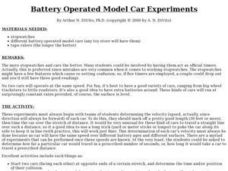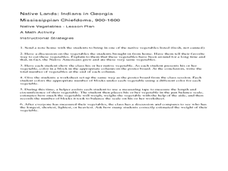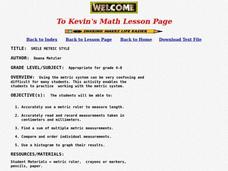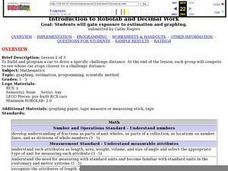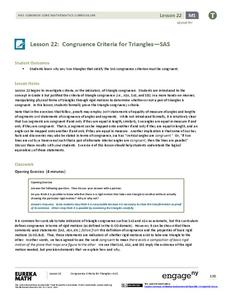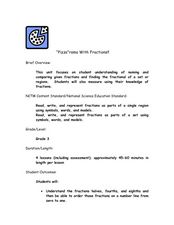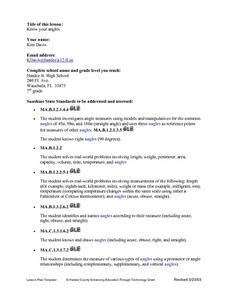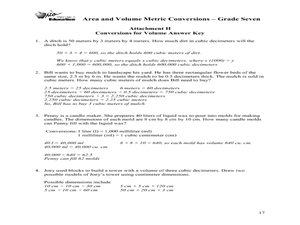Curated OER
Measurement, Scale and the Corn Dolly
Students read and discuss the story The Corn Dolly by Terry Jones. The teacher shows the class a corn dolly and they need to design and construct furniture that is appropriately scaled for that specific dolly.
Curated OER
Battery Operated Model Car Experiments
Students time battery operated cars over a set track and determine the velocity of each type of car. They use the cars as manipulatives to demonstrate word problems involving velocity.
Curated OER
Rubber Band
Eighth graders investigate what would happen to the length of a rubber band as more and more rings were hung on it. They base their explanation on what they observed, and as they develop cognitive skills, they should be able to...
Curated OER
Tennis Triangle
High schoolers calculate the height of a tree or flagpole. They measure the shadow of the tree or flagpole and the length of a shadow of a meterstick. Using similar triangles, calculate the heigh. Devise two additional ways in which to...
Curated OER
Native Lands: Indian in Georgia
Students bring in vegetables that the Native Americans ate. In this vegetable lesson, students create a graph that shows how many students brought in each vegetable. They measure their vegetable to find the length, circumference, and...
Curated OER
Smile Metric Style
Students practice working with the metric system. Students use a metric ruler to measure and record lengths of group member's smiles, and graph their results. Students find the sum of all the smiles.
Curated OER
Smile Metric Style
Students measure the length of student smiles and then record, order and graph their results.
Curated OER
The Golden Ratio
Seventh graders investigate a ratio found in nature and in numerous pieces of artwork throughout history. The lesson is cross-curricular and builds a sense of appreciation of design for students.
Curated OER
Smile Metric Style
Pupils take measurements using a metric ruler, find a sum of multiple metric measurements, and use a histogram to graph their results.
Curated OER
Time Flies When Math Is Fun
Third graders pracdtice telling time with a demonstration clock.
Curated OER
Measuring Angles
Third graders describe an amount of turn from a particular position to another using the 'circular' benchmarks of 0, ++, ++, ++, and full turn. Estimation language such as 'just about', 'between', 'not quite', 'just over', and similar...
Curated OER
High School Mathematics Problems from Alaska: Azimuth and Arc Length
Young scholars track the Azimuth sunrise and sunset over time by creating a chart.
Curated OER
Measuring with Mathematics
Eighth graders discover how the change in the dimensions of a shape cause a change in the overall area of the shape, but the perimeter stay the same. They, in groups, go out to the playground and construct large areas using stakes and rope.
Curated OER
Math 6 - Act. 04: Dishes for a Penny
Sixth graders complete activities to determine if they would like to do the dishes on this pay schedule: first night 1 penny, and each night after the amount double.
Curated OER
Exploring Length and Perimeter
Sixth graders determine the perimeter of geometric shapes with a grid at technology based resource. While looking at figures on an overhead, they determine how much border they would need to go around a figure. They also complete...
Curated OER
NetsS.A. of Prisms
Young scholars build nets of three-dimensional prisms based on the dimensions they are given for hexagonal prism, triangular prism, rectangular prism. Working in groups, they use their prisms and calculate the Surface Area and Lateral Area.
Curated OER
Go The Distance Car Construction
Students build and program a car to drive a specific challenge distance.They must at the end of the instructional activity, have the car that stops the closest to a challenge distance.
EngageNY
Congruence Criteria for Triangles—SAS
Looking for a different approach to triangle congruence criteria? Employ transformations to determine congruent triangles. Learners list the transformations required to map one triangle to the next. They learn to identify congruence if...
Curated OER
"Pizza"rama With Fractions!!
Young mathematicians explore number values by utilizing food as a visual aide. They discuss the differences between halves, fourths, and eighths and how they are visually represented by a pizza. Then create their own pizza in class and...
National Security Agency
Classifying Triangles
Building on young mathematicians' prior knowledge of three-sided shapes, this lesson series explores the defining characteristics of different types of triangles. Starting with a shared reading of the children's book The Greedy Triangle,...
EngageNY
The Angle-Angle (AA) Criterion for Two Triangles to Be Similar
What do you need to prove triangles are similar? Learners answer this question through a construction exploration. Once they establish the criteria, they use the congruence and proportionality properties of similar objects to find...
EngageNY
The Side-Angle-Side (SAS) and Side-Side-Side (SSS) Criteria for Two Triangles to Be Similar
Playing with mathematics can invoke curiosity and excitement. As pupils construct triangles with given criteria, they determine the necessary requirements to support similarity. After determining the criteria, they practice verifying...
Curated OER
Know Your Angles
Explore types of angles and the characteristics of each. After observing a PowerPoint Presentation, learners tour the school facilities and use a digital camera to capture prescribed angles. Using the digital pictures and written...
Curated OER
Area and Volume Metric Conversions - Grade Seven
Students investigate unit conversion. For this unit conversion lesson, students will build models of square and cubic centimeters using grid paper and generate formula tables for converting units of area and volume. The tables will be...



